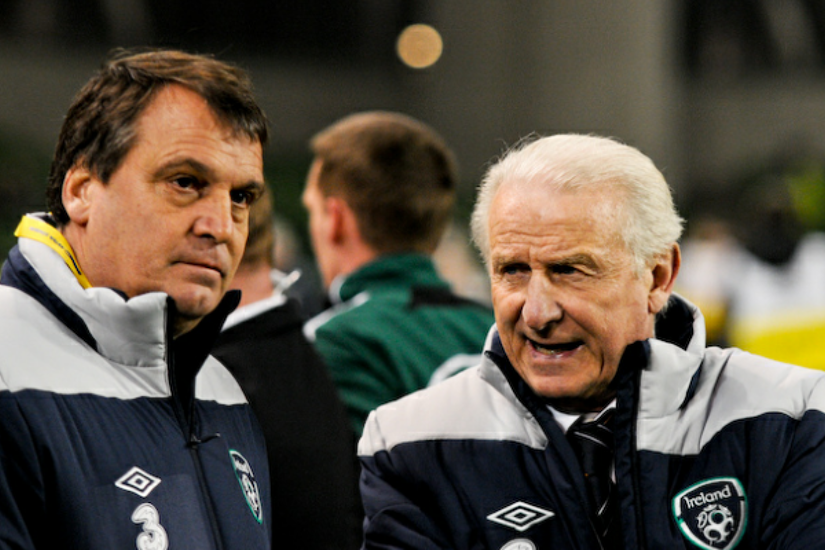A Euro Vision

Credit: Extratime Team (ETPhotos)
…or how I learned to stop worrying and love the result
“I once played in 45 degree heat, in Brazil against Santos; I was melting like a candle.”
Giovanni Trapattoni’s parting words to the assembled media as he half-stood behind the small row of microphones which had been picking up his post-Bosnia thoughts. Having spent the game, a deserved 1-0 win for the home side, in the heavily shaded Aviva Stadium press box, the Italian’s rather graphic metaphor only really hit home once I headed outside into the Dublin sunshine. Making my way towards the city centre, my sweat began to feel like thick wax sliding away and diminishing what was left of my ill-scented frame.
I was not alone in this struggle. My Extratime colleague Brian Fitzgerald travelled with me and together we talked about this ‘new’ Ireland. From our privileged position, we had watched Aiden McGeady shift his body weight as though he were a sapling in a thunderstorm – the ball stood still at the roots, while Bosnian defenders followed the leaves. His inch-perfect delivery found the head of Shane Long and the Tipperary-native beat Asmir Begovic and his compatriots with one twist of his neck. Ireland had won again.
Afterwards, many dismissed the significance of the win. After all, it was ‘only a friendly’. But that is exactly why it was significant. Brian and I discussed how marvellous it was that winning – or at least, not losing – had become the expectation and not the hope of Irish fans. Teams now recognise the danger of playing Ireland; and it is not a fear of an individual danger, it is the more potent fear of a unified collective, a team.
Regardless of Ireland’s performance in the upcoming European Championships, perhaps Trapattoni’s greatest legacy will be the new mentality which he has installed in these Ireland players. “Ireland caps are no longer taken for granted”, opined Brian (I’m paraphrasing, as my alcohol-affected memory cannot be relied upon). And this is perfectly true. We’ve come an awfully long way from the days of Joey Lapira.
If you’ve stopped here to desperately recall where you’ve heard that name before, then my point is proven. Lapira was included in Steve Staunton’s Ireland squad for a summer tour of the United States in 2007. On May 23rd of that year, he became the first amateur to play for the Republic since Willie Browne in the early ‘60s. A celebrated ‘soccer’ player in the collegiate ranks of America at the time, Lapira has since gone on to lower-league Norwegian football via an unsuccessful trial at Rangers.
While many may rail against Trapattoni’s refusal to experiment and try new players, his rigid loyalty to his players – and more importantly his system – does have its benefits. For one, this squad is about as tight a group as will feature at these Championships. International football is famously the tortoise to club football’s hare from a manager’s perspective. Progress is slow, but Trapattoni has ensured that it is tangible. Even in friendlies, the Italian regularly starts his first-choice XI, ensuring that they continue to grow and learn as a group. He now trusts them implicitly.
Even when changes must occur; they are never seismic. They only alter by degrees – and even then, more Wexford in winter than Santos in summer.
An example is James McClean, whose unforeseeable rise has propelled him into first-team contention. With the public demanding his inclusion, he has been given his chance with one caveat: he must learn to adapt his game to this system, and these teammates. He played 90 minutes on Saturday, with Trapattoni confirming that he wanted to allow the ex-Derry City winger as much time as possible to gel with the others. In other words, to show that he can be trusted.
Miguel Delaney recently penned a terrific article highlighting the crucial role played by the wingers in Trapattoni’s system. As the only players in the team awarded any true creative licence, they must run themselves into the ground in order to be a factor at both ends of the pitch. They must couple effective attacking play with the responsibility to be a part of the defensive effort by protecting their full-backs and keeping the Holy Shape. As Delaney points out, it is for this reason that they are almost always the first players to be substituted. It was heartening then, to see McClean backtracking and closing down consistently before he inevitably tired as the game wore on. He wants to fit in.
Once Brian and I had finally reached our destination, we began to relax and stopped talking shop. The Eurovision Song Contest played on the TV behind the bar, though mercifully drowned out by the sounds of every indie hit from the beginning of the last decade. A trio of American tourists sat on stools with faces of interested curiosity. Chicago-natives, they inquired thusly: ‘what the hell is this?” through beaming smiles. I tried to explain that behind the awful lip-synching and pageantry lay a chance for all of Europe to highlight their parochial biases. I said that it was a loaded deck; that the winners were the most outrageous or the ones who had the most friends. A popularity contest, the kind Ireland can’t win. At least not since it stopped being judged on vocal talent.
But this summer Ireland will have the chance to compete against their European brethren in a fair game. As Greece proved eight years ago, the unfashionable, unattractive team can win. If they are a TEAM.
It may have been the Jack Daniels, but as I sat in the bar watching the beautiful Swedish entry stroll victoriously to the stage, I was filled with hope. Ireland probably won’t come close to winning the European Championships, but with such a stellar group we do have the opportunity to strike a blow for the lesser-shining stars of the footballing firmament. In a climate of £80 million transfer fees and prima-donna players, it would sure be nice to remind people of the power, and worth, of a true team.
We have been typecast as perennial underdogs, but that doesn’t mean we must settle for supporting roles. Trapattoni was brought in for this reason; he was brought in to scrap all pretences of aesthetic beauty and focus instead on results. This he has done. Ireland’s current mentality does not pander to idealism, it is pragmatic and effective. So much so, that even friendlies are treated with seriousness – that is Trapattoni’s greatest success.
If the players are prepared to give their all in ‘meaningless’ games, then in a couple of weeks, with everything on the line, they are capable of greatness.

